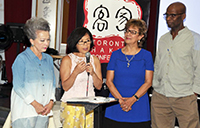York University hosted and co-sponsored the 2016 Toronto Hakka Conference in support of the most diasporic of Chinese ethnic groups – the Hakka people. The July 1 to 3 conference, which attracted an international audience, was co-organized with the Hakka Conference Committee and the Department of Humanities in the Faculty of Liberal Arts & Professional Studies (LAPS).

The conference opened with a reception on July 1 at the Chinese Cultural Centre of Greater Toronto before moving for the rest of the weekend to York’s Vari Hall on the Keele campus for lectures and workshops.
Topics of identity, mixed ancestry, history, popular culture, language and war, among others, were discussed under the groupings of art, the environment and the forefront of modern-day life.
“Holding the conference at York is our way of recognizing the importance of the Hakka community and the Hakka Conference in itself,” said Associate Dean of Global & Community Engagement Narda Razack, adding that the University community includes professors and students of Hakka descent.

Razack credits the Department of Humanities, chaired by Professor Andrea Davis, and the department’s East Asian Studies program – the conference’s primary co-sponsor since its inception – for providing academic and facilities support to the Hakka community organizing committee.
“As a deeply diasporic community, Hakka Chinese represent the best of Canada’s commitment to multicultural nationhood, revering their history and remembering their origins while contributing wholeheartedly to the political, economic and cultural advancement of Canadian society,” said Davis. “I was enormously pleased to be involved in the fifth conference in 2016. I was impressed by the international scope of the conference – attracting participants from across North America, the Caribbean, India, Mauritius and Australia – and the high level of scholarship. The conference is a remarkable testament to the importance of community engagement in research and the role York plays as a leader in this regard.”
Professor Carl E. James, Jean Augustine Chair in the Faculty of Education, organized a panel of PhD students to speak on Hakka identity during the conference.
“This conference continues to be an important cultural and intellectual event, not only for the Hakka diaspora but also for us in the York University community,” said James. “The keynotes and workshop sessions covered a diverse and interesting range of topics and helped us to understand the variation, complexity and multiplicity of identity and identification, the impact of multigenerational migration on families and communities, and the contributions of Hakka peoples to societies throughout the world.
“I am also pleased to have worked with colleague Professor Andrea Davis and the organizing committee to introduce graduate student panels to the conference, as this lays a solid foundation for engaging youth and emerging scholars.”
Present at the conference was former Canadian senator Vivienne Poy, who has been the patron of this conference since its inception. Also in attendance was Donette M. Chin-Loy Chang, who recently announced a donation to inaugurate the G. Raymond Chang Distinguished Speaker Series at the conference launch party on May 28 for the fifth Toronto Hakka Conference.
Chang’s husband, the late G. Raymond Chang, former chancellor of Ryerson University, co-founded the quadrennial conference in the year 2000 with organizer Keith Lowe as a community-university event with York University. It is the hope of organizers that the Toronto conference will continue to inspire and mobilize Hakka communities in other cities. The fourth conference, held in 2012, gave birth to the first New York Hakka Conference in 2015.


